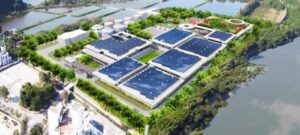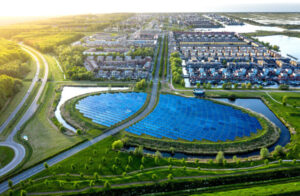International companies look to the Netherlands for its logistics solutions, collaborative workforce and sustainability expertise and innovation.
Some people dwell on the past, rehashing what went wrong. Others refuse to let the past hinder them. Instead, they use the past to inform their future and allow it to propel them towards greatness.
The Netherlands are in the latter category.
It goes without saying that 2020 was an unusual year. Due to the Covid-19 pandemic, global foreign direct investment took a dip. However, despite an unprecedented year, the Netherlands remains attractive for foreign companies. The Dutch quickly realized as global leaders in innovation that their inherent resilience and adaptiveness could be used as a compass to point them in the right direction.
Here are just a few of the highlights that showcase Dutch resilience and willingness to adapt from 2020.
Europe’s leading logistics location

The European logistics industry faced unique challenges over the past year, from Brexit to the COVID-19 pandemic.
The Port of Rotterdam has been Europe’s busiest container port for years, and 2020 was no different. Customs officials in Rotterdam stepped up to meet the challenge stemming from Brexit, hiring more than 900 additional agents over the last couple of years. Additionally, Bloomberg noted that UPS in the Netherlands built freezer farms to keep COVID vaccines at the proper temperature, ready for air transportation and distribution.
The logistics magazine, DC Velocity reported that Royal FloraHolland’s success at streamlining the plant and flower supply chain via collaborative digitization efforts and better packaging, storage and transport. Royal FloraHolland buys and sells 40,000 different varieties of plants and flowers from over 60 countries.
The U.S.-based shoe company Crocs recently opened their EMEA headquarters in the Netherlands, recognizing the country’s strategic location to move their products throughout the world; a testament to foreign direct investment. They recently broke ground on a 35,000 square meter distribution center at DistriPark Dordrecht, a new logistics business park in the province of South Holland.
Monster Group, Napoleon, Danone, Nippon Express and Snag Tights are just a few others who have moved distribution and logistics operations into the Netherlands in and prior to 2020.
A plant-based protein powerhouse

One major area of continued innovation – in part from foreign direct investment – is the Netherlands’ agrifood industry. Fast Company reported that more than 60 plant-based food companies and research institutions operate in the Netherlands, with more popping up on a regular basis. Currently, several smaller food tech specialists have also started to expand, including Plenti, Top bv and Fumi Ingredients.
The reason for so much plant-based innovation in the Netherlands is because the Dutch understand the need for greater sustainability. In fact, the country has its own dedicated plant-based research lab in the Dutch town of Wageningen, also home to the number one agricultural university in the world – Wageningen University and Research.
In 2020, BASF Vegetable Seeds began collaborations with Maastricht University on healthy and sustainable vegetable production. This year, their cooperation will culminate in a new facility at Brightlands Campus Greenport Venlo, the Netherlands. The center will research modern breeding techniques, artificial intelligence and sensory technology – all in an effort for a more sustainable food industry.
Beyond Meat, one of the fastest growing food companies in the United States, also opened their first manufacturing facility in Europe in Enschede, the Netherlands. The new location will allow the company end-to-end production capabilities in Europe.
Finding new life sciences and health solutions

In March 2020, Dutch scientists were able to identify the novel coronavirus strand in sewer excrement before reports of the first the first infection. In the following months, a research paper from Utrecht University in the Netherlands detailed scientists’ creation of a monoclonal antibody which demonstrated an ability to defeat coronavirus in the lab. Dr. Frank Grosveld, co-lead author on the study, explained that the discovery provided “a strong foundation for additional research to characterize this antibody and begin development as a potential COVID-19 treatment.”
Utrecht University is not the only institution making major strides against the coronavirus. NL Times reported that in April the Dutch government has contributed 50 million euros to international research for a coronavirus vaccine.
In response to the country’s dedication to life and health sciences, several companies drove major investments in the Netherlands last year. Alnylam Pharmaceuticals expanded beyond their presence established in 2018, with the company’s president Barry Greene noting the country’s “vibrant biotech ecosystem and attractive environment, which makes it possible for companies with groundbreaking innovation to flourish.” The Netherlands will also continue to be home to several Phase 3 clinical trial sites across Alnylam’s late-stage assets.
Meanwhile, MSD (the biggest pharmaceutical company in the Netherlands) announced a spinoff for Women’s Health called Organon to quickly react to specific patient needs. The goal for Organon is to become a world leader in women’s health and will employ 1,200-1,600 people in the Netherlands. MSD further commits to the strengths of the Dutch Life Science Health community and its efforts to remain future-focused.
Taiwan-based TCI Biotech, an original design manufacturer (ODM) of functional foodstuffs and skin care products, also recently opened its first European office at the Port of Rotterdam, noting the country’s “excellent business climate, strategic location and advanced transport infrastructure.” Additionally, Kite Pharma – a subsidiary of Gilead Sciences – is working to implement the first CAR T cell therapy for certain types of non-Hodgkin lymphoma. Kite’s manufacturing facility in Amsterdam is now fully operational to manufacture individualized cell therapies for up to 4,000 European cancer patients per year.
Where technology and digitalization thrive

Technology is also having a boom in the Netherlands thanks to foreign direct investment, with the Dutch tech sector having seven times the net worth it had just five years ago. Two of Europe’s highest valued unicorns – Adyen, the highly successful payment platform used by Uber, and Takeaway.com, a leading food delivery marketplace, both had their origins in the Netherlands. Dealroom.co also listed both companies on the Most Valuable European companies founded after 1990 list. Takeaway.com’s Manager of Investor Relations, Joris Wilton told Sifted the reason the Netherlands has been a great place for tech startups is because the country has been “entrepreneurial for centuries.”
The Netherlands is becoming a quantum technology leader with companies like Orange Quantum Systems efforts to produce the world’s first quantum computer. In fact, the Netherlands has invested around 350 million euro into quantum technology research over the past five years. The potential for understanding could have far reaching implications for society, impacting energy, healthcare, and logistics sectors, to name a few.
The Dutch are also leading the way in remote work with their strong digital network. The country was ranked sixth in a digital readiness index in 2019, with 99% of households having broadband connections, and placed in the top 5 global leaders for innovation by the Global Innovation Index 2020 and the European Innovation Scoreboard. The Harvard Business Review ranked the Netherlands and Singapore as the best prepared to work from a distance when the first round of coronavirus lockdowns came in early 2020.
When New York-based company Lemonade was looking for a European headquarters, the two founders, Daniel Schreiber and Shai Wininger landed on the Netherlands for its collaborative prowess, multilingual and highly educated workforce and stable business climate with accessibility to other Europeans markets.
But the Netherlands isn’t only home to newcomers. U.S.-based international media company Discovery has been growing their Dutch operations since the late 1980s, and recently opened a new state-of-the-art technology hub in Hilversum, the Netherlands, to facilitate the storage of sport content production, including the Olympics Games Tokyo 2021.







